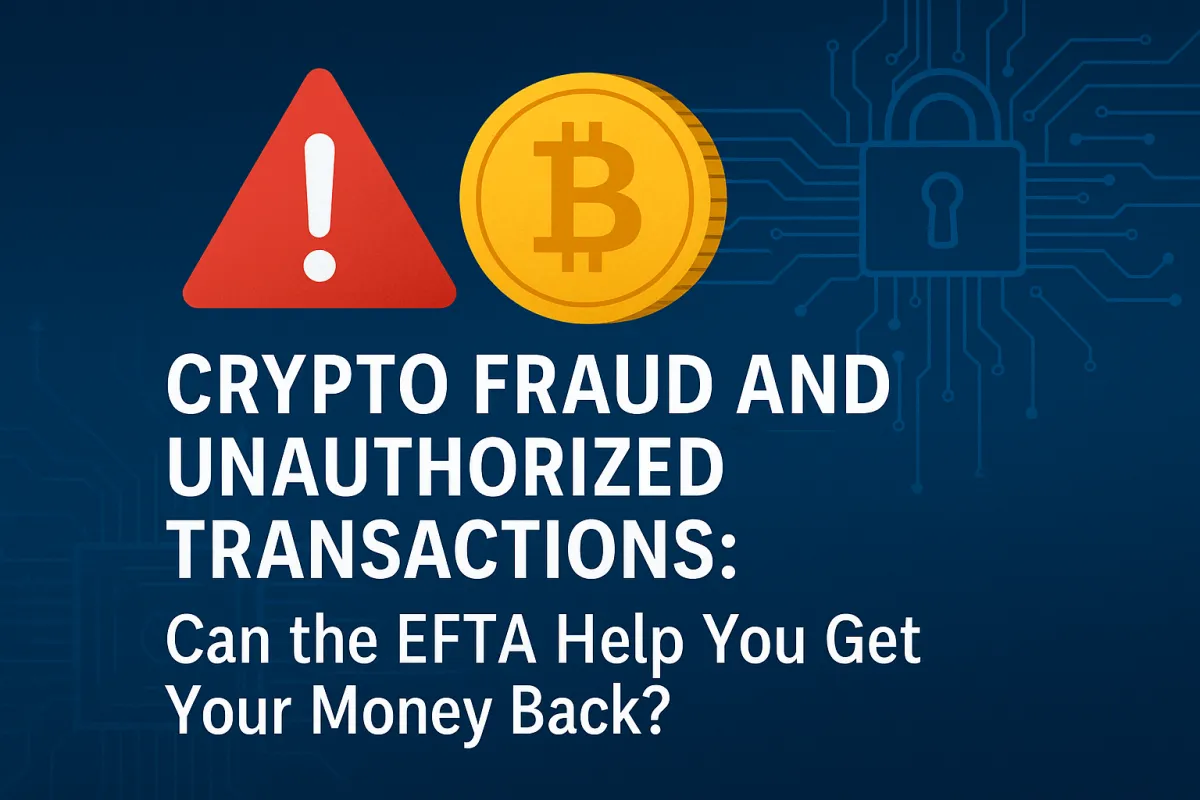
Crypto Fraud and Unauthorized Transactions: Can the EFTA Help You Get Your Money Back?
Crypto Fraud and Unauthorized Transactions: Can the EFTA Help You Get Your Money Back?
Cryptocurrencies have surged in both popularity and value, offering consumers a variety of benefits. But as with any new technology, unsavory individuals and scammers will try to game the system and steal your hard earned cryptocurrency. With this risk you might ask: What if any legal protections are available to recover your losses after an unauthorized transaction?
The short answer is it depends. Whether your crypto is protected rests on how and where the unauthorized transaction takes place, particularly if it involves your bank account or debit card. The Electronic Fund Transfer Act (EFTA) is the main law providing protections for consumers facing unauthorized transactions. While it was mainly designed to protect bank transfers of fiat currency, it may apply to crypto currency in some scenarios, but every scenario.
We will navigate how the EFTA applies to crypto fraud and unauthorized transactions, helping you understand your rights and what actions you can take to protect your assets.
What Is the EFTA and When Does It Apply?
The Electronic Fund Transfer Act (EFTA) is a federal law designed to protect consumers when making electronic transactions, such as using debit cards, or sending money via Zelle or Venmo. It ensures you can dispute unauthorized transactions and, in many cases, get your money back.
But things get trickier when it comes to cryptocurrency. When it comes to pure crypto transactions, like transferring cryptocurrency from one private wallet to another, these peer to peer transactions fall out of the bounds of EFTA protections.
Where the EFTA may apply is when a third party like Coinbase or Binance is involved. If you are trading crypto on one of these third party exchanges and unauthorized transactions involve your bank account or debit card, the EFTA can provide legal protections to help you recover your funds.
Some examples of transactions covered by the EFTA:
Buying Bitcoin with your credit card
Withdrawing USD from a crypto platform to your bank account
Unauthorized access to an exchange linked to your bank account
The key question isn’t just what happened—but how and where the transaction occurred.
When the EFTA Doesn’t Apply
While the EFTA offers strong protections for many electronic bank transactions, it doesn’t cover most direct crypto activity. If your crypto is stolen in one of these scenarios, you’re likely outside the law’s reach:
Peer-to-peer transfers between private wallets:
Sending crypto directly from one wallet to another—without a bank or regulated exchange involved—falls completely outside the EFTA. There's no third-party institution to hold accountable.Decentralized platforms like Uniswap or MetaMask:
These platforms run on smart contracts, not traditional financial systems. There’s no customer service, no dispute resolution, and no legal safety net if something goes wrong.Losses from hacks, phishing scams, or fraud:
If you were tricked into sending crypto or your private keys were compromised, those are considered voluntary or user-initiated actions—even if you were misled. The EFTA won’t help you recover those funds.No chargebacks in crypto:
Unlike with debit or credit card transactions, crypto transfers are permanent. Once confirmed on the blockchain, they cannot be reversed, regardless of the circumstances.
If your crypto was sent directly on a blockchain or lost through a scam, the EFTA isn’t designed to protect you. That’s why knowing the type of platform you’re using, and the risks involved, is crucial.
What to Do If You’re a Victim of Crypto Fraud:
If you’ve been targeted by a scam or discover unauthorized crypto transactions, you must act swiftly, especially if your bank account or debit card was involved. Here are the basic steps to take full advantage of your legal rights:
Act Fast: Under the Electronic Fund Transfer Act (EFTA), you typically have 60 days from the date of the unauthorized transaction to report it. Delaying can limit or eliminate your legal protections.
Dispute the Transaction: If the fraudulent crypto transaction involves a bank-linked platform like a crypto exchange, contact your bank and the exchange immediately. They may be required to investigate the dispute and in some cases reimburse you.
File Complaints: Even if the EFTA doesn’t apply, filing formal complaints can help build your case and trigger regulatory scrutiny. Try filing complaints with the Consumer Financial Protection Bureau (CFPB) (cfpb.gov) and the Federal Trade Commission (FTC) (reportfraud.ftc.gov). Or file a complaint with your State Attorney General’s Office.
Report Possible Crime: If you think your crypto was stolen through hacking, identity theft or other scams you should report it as a crime. File a report with your local law enforcement and the FBI’s Internet Crime Complaint Center (IC3): ic3.gov.
Document Everything: Keep records of transaction IDs, blockchain confirmations, emails, screenshots, chat/call logs with scammers or platforms, and police reports.
Consult Consumer Rights Attorneys: Like our team at Tariq Law, our skilled team can help you navigate your dispute, file a lawsuit if necessary, and help determine whether or not the EFTA or other laws apply to your situation, and what damages or reimbursement you are entitled to.
Know Your Rights and Protect Your Digital Wealth
As cryptocurrency pushes the envelope of finance, consumer protection laws are still playing catch up. The Electronic Fund Transfer Act (EFTA) may not cover every type of crypto transaction, but in certain cases especially where your bank account or debit card is involved, it can be a critical tool for recovering losses.
If you’ve been affected by crypto fraud, acting quickly and preserving documentation is key. And when you’re facing complex digital financial losses, legal guidance can make all the difference.
At Tariq Law, we specialize in protecting consumers like you. Whether your case involves crypto platforms, unauthorized bank-linked transactions, or broader financial abuse, we’re here to help you explore your options and fight for the compensation you deserve.
